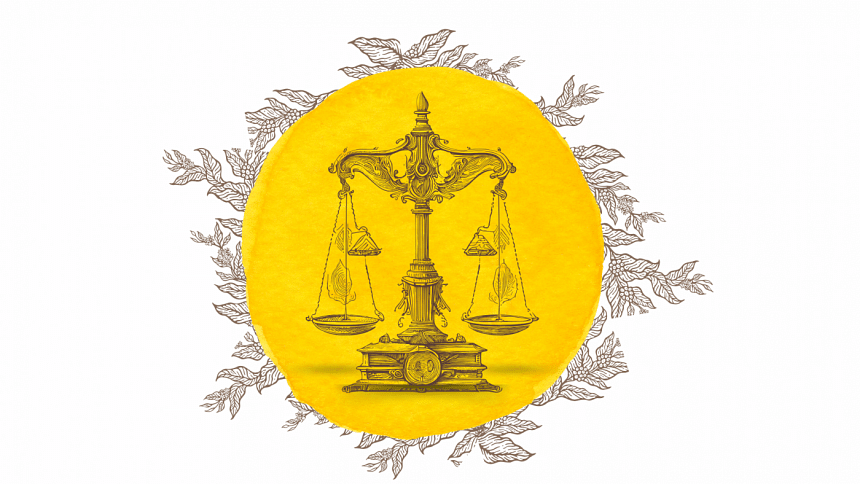Reforms in the judiciary are essential to restoring people’s trust

Having stepped into an era of hope and uncertainty, all of us now dream of a state that is just, efficient, and accountable. However, for this dream to materialise – even a fraction of it – and prevent history from repeating itself, a strong, independent, and impartial judiciary is an essential prerequisite. As individuals who aspire to practice law and ensure its proper implementation, students of law understand and feel the need for such a judiciary.
An issue that poses a fundamental roadblock to the dispensation of justice in this country is the overwhelming backlog of pending cases in courts. Having doubled in the past 15 years, the number of pending cases in our courts stood at 4.2 million in 2023, according to an article by Dhaka Tribune. The lack of judges is to blame for this, with there being just one judge for every 94,444 people.
Mahfuz Ul Haque, a Master of Laws (LLM) student at the Islamic University, Kushtia, believes that steps must be taken to increase the appointments of judges at the Supreme Court and subordinate courts. He also suggests that more specialised courts and tribunals could be established to deal with this issue. "To reduce the number of cases, alternative dispute resolution (ADR) should be made more effective in civil suits. This can be done by penalising negligence in the ADR process."
While successfully meeting the people's demand for justice in an efficient and timely fashion is a necessity, the indispensable function of guarding the constitution and holding other organs of the state – the legislature and the executive – is just as important. Through writs, courts can call into question the legality and constitutionality of acts of public bodies. This ensures a system of checks and balances where the government or any of its officials can be challenged in court if they overstep legal bounds.
"I believe that during the previous regime, the lack of judicial independence was a serious problem. This compromised the fairness and impartiality of the justice system, which is a cornerstone of democracy," says Tahsin Hasan Ameer, a final semester LLB student at BRAC University. He adds, "Going forward, it is essential that the judiciary remains completely independent from political influence. Judges must be able to make decisions based solely on the law and facts to ensure the justice system remains fair and trustworthy."
Aside from making sure that our judiciary is independent of interferences, it is also crucial to ensure that corruption and political bias cannot once again take root in the justice system.
Zaid Ekram, an undergraduate Law student at Dhaka University, expresses his views on the corrupt practices that have gone on in our courts. He says, "It is common knowledge that money exchanges hands often in the courthouses of Bangladesh. Cases as simple as land registration disputes stay on the court's floors for decades, accruing thousands, if not lakhs of taka, for state prosecutors, court officials, and sometimes even judges," he says. "The tendons of corruption have reached so far into all of the state's mechanisms, and the court is no exception. People fear being harassed and extorted by the court itself. How can there be justice when people cannot even believe in it?"
Political biases of judges and the perception of a politically biased judiciary have also had a similar effect on the people's faith in the law. Tahsin explains, "If judges are perceived to be aligned with specific political interests, it weakens their credibility and the public's trust in the law. For the sake of a strong and balanced democracy, it is therefore crucial that they remain neutral and confine themselves outside the fold of politics."
The fall of the previous regime can only do so much to ameliorate the weaknesses of our state. Thus, a collective effort is needed to strengthen this vital organ.
Nafisa Binte Borhan, a third-year student at London College of Legal Studies (South), discusses reform measures that could help realise a judiciary that is more in line with democratic values. She suggests, "The enactment of a Judicial Appointment Commission Act could ensure merit-based appointments devoid of political influence. This commission should be diverse, comprising members from the judiciary, civil society, and academia, ensuring that appointments are based on competence and integrity rather than political favouritism."
It should be noted that to implement this, constitutional reform would be necessary. As per Articles 95 and 98 of our Constitution, the power to appoint judges in the Supreme Court is vested with the President, a power that is ultimately exercised by the Prime Minister. The President is required under Article 48(3) to follow the advice of the Prime Minister in appointing Supreme Court judges other than the Chief Justice.
Nafisa further adds, "To reduce bias and corruption, transparency must be prioritised. The Right to Information (RTI) Act, 2009, and The Whistleblower Protection Act, 2011, act as critical tools in this regard. It is essential that these laws are strengthened to encourage transparency in court proceedings and judicial conduct. Further, we must enforce anti-corruption provisions and amend them to include special provisions as well. Expedited trials for corrupt judges under specialised tribunals – as empowered by the Special Powers Act, 1974 – could help restore public confidence."
Nonetheless, ideas – no matter how well thought out – can only be conducive towards real change if they are executed with pragmatism and consideration of the nuances of the situation. With the knowledge that students have earned in their comparably insignificant years, they can only have hopes and ideals for a nation that is more just. Ultimately, the responsibility lies with those whom the students have entrusted to actualise their aspirations.
Nayeem is a contributor for The Daily Star and a student of law
References:
Dhaka Tribune (August 30, 2023). Bangladesh has one judge for 95,000 people
Bangladesh Law Digest (June 10, 2017). Appointment of Supreme Court Judges : Article 95(2) Revisited

 For all latest news, follow The Daily Star's Google News channel.
For all latest news, follow The Daily Star's Google News channel. 








Comments